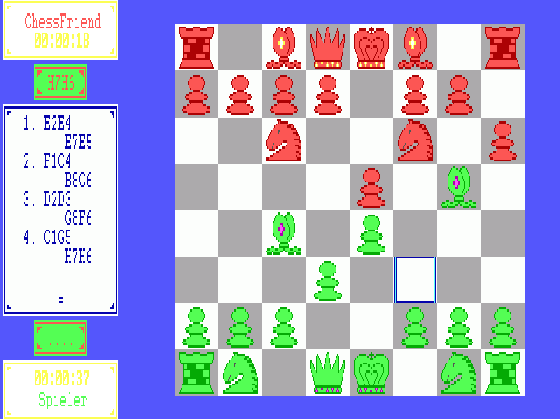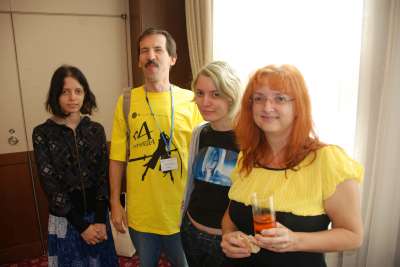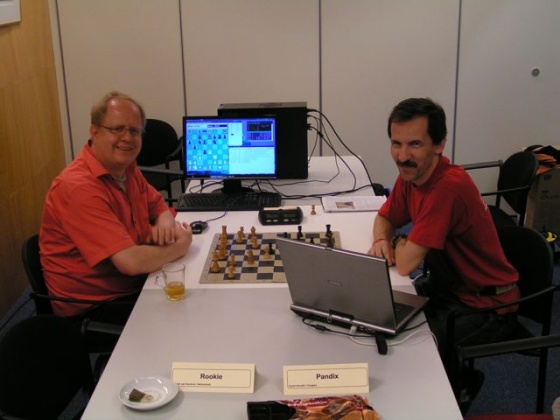Pandix
Pandix,
a chess program by Gyula Horváth and at times by Zsuzsa Horváth - the development already started in 1984. Pandix, written in C, has a huge tournament history, starting at the WMCCC 1987 until last recently runner-up the CCT14 in 2012. Pandix ChessFriend was commercial in the 90s as x86 PC program running under MS-DOS with an own GUI including a 3D board representation and graphics piece editor. Since 1993, Csaba Szûts is author of Pandix' opening book.
Contents
Tournaments
Beside five World Microcomputer Chess Championships [1], seven World Computer Chess Championships, three World Chess Software Championships, Pandix played three Aegon Tournaments and various Hungarian Chessprogram Open, International CSVN Tournaments, Dutch Open Computer Chess Championships and Online Computer Chess Tournaments. After more than a decade of recreation and abstinence from competing in tournaments, Gyula started a comeback at the DOCCC 2008, and the WCCC 2009. Pandix Breakthrough, now UCI compliant running under Windows, played a strong WCCC 2010. In June 2011, Pandix won the ICT 2011 with 7 out of 7, and in July 2011 the WCRCC 2011 [2].
Yokohama 2013
At the WCSC 2013 in Yokohama, Pandix by Gyula Horváth started a great pursuit with 4½/5 in the second half, for a Silver medal shared with Junior, a half point behind Gold medalist HIARCS. Also the open hardware WCCC 2013 was a great tournament for Pandix, winning Bronce in the main course and blitz.
Screenshot
Pandix ChessFriend (1991) [3]
Photos & Games
2010
Team Pandix [4], Nelli, Gyula, Ditta and Zsuzsa Horváth [5], Kanazawa, 2010 [6]
[Event "WCCC 2010"] [Site "Kanazawa, Japan"] [Date "2010.09.25"] [Round "3"] [White "Pandix Breakthrough"] [Black "Rybka"] [Result "1/2-1/2"] 1.c4 e5 2.Nc3 Nc6 3.Nf3 Nf6 4.g3 Bb4 5.Bg2 O-O 6.O-O Bxc3 7.bxc3 d6 8.d3 h6 9.Ne1 e4 10.Nc2 Re8 11.Ne3 Rb8 12.Rb1 b6 13.dxe4 Na5 14.Qc2 Ng4 15.c5 Nxe3 16.Bxe3 Nc4 17.cxb6 axb6 18.Bc1 Bd7 19.a4 Ra8 20.Rb4 Ne5 21.f4 c5 22.Rb1 Bxa4 23.Qd2 Nc4 24.Qd3 b5 25.e5 Rb8 26.Bc6 Re7 27.Ra1 Rc8 28.Bg2 dxe5 29.Rxa4 Qxd3 30.exd3 bxa4 31.dxc4 exf4 32.Bxf4 Re2 33.Ra1 g5 34.Bf3 Rc2 35.Bc1 Rb8 36.Bd5 Rxc3 37.Ba3 Rd8 38.Kf2 Rc8 39.Ra2 h5 40.Kf1 g4 41.Kf2 Rd8 42.Ra1 Rc8 43.Ke2 Rc2+ 44.Kd3 Rxh2 45.Bc1 h4 46.gxh4 Re8 47.Bf4 Rh3+ 48.Kd2 a3 49.Bd6 Ree3 50.Rg1 Kh7 51.Rxg4 a2 52.Rg1 Ra3 53.Ra1 f5 54.h5 Rxh5 55.Kc1 Ra5 56.Kc2 Rh3 57.Be5 Ra6 58.Kb2 Re3 59.Rh1+ Kg6 60.Rg1+ Kh5 61.Bf4 Rea3 62.Ka1 Rb6 63.Be5 Rb1+ 64.Rxb1 axb1=Q+ 65.Kxb1 Ra6 66.Bf3+ Kg5 67.Kb2 f4 68.Bc3 Re6 69.Kc2 Ra6 70.Be1 Ra2+ 71.Kb3 Ra1 72.Bc3 Rb1+ 73.Kc2 Rf1 74.Be4 Kg4 75.Kd2 Rf2+ 76.Kd3 f3 77.Bd2 Re2 78.Be3 Kg3 79.Bxc5 Re1 80.Bc6 Re6 81.Be4 Kg4 82.Bd5 Re8 83.Bd4 Kg3 84.c5 f2 85.Bxf2+ Kxf2 1/2-1/2
2011
Marcel van Kervinck and Gyula Horváth, Rookie - Pandix, ICT 2011 [7]
[Event "ICT 11"] [Site "Leiden"] [Date "2011.06.12"] [Round "7"] [White "Rookie"] [Black "Pandix"] [Result "0-1"] 1.e4 e5 2.Nf3 Nc6 3.Bb5 a6 4.Ba4 Nf6 5.d4 exd4 6.O-O Be7 7.Re1 b5 8.Bb3 d6 9.c3 dxc3 10.Nxc3 O-O 11.h3 Bb7 12.Bf4 Na5 13.Bc2 Re8 14.b3 Nc6 15.Rc1 Ne5 16.Nd5 Ng6 17.Bg3 Bf8 18.Qd4 Ne5 19.Bh4 c5 20.Qd1 Bxd5 21.exd5 Ned7 22.Qd2 Qc7 23.Nh2 g6 24.Ng4 Rxe1+ 25.Rxe1 Nxg4 26.hxg4 c4 27.bxc4 bxc4 28.g5 Qc5 29.Bg3 Nb6 30.Rd1 Re8 31.a4 Bg7 32.a5 c3 33.Qf4 Be5 34.Qf3 Bxg3 35.axb6 Be5 36.Rb1 Rb8 37.b7 Qc7 38.Qe3 Rxb7 39.Rxb7 Qxb7 40.f4 Bg7 41.Qe8+ Bf8 42.Qe4 Qb5 43.Kf2 Bg7 44.g4 a5 45.Ke3 Qf1 46.Qe8+ Bf8 47.Qe4 Qh3+ 48.Qf3 Qh2 49.Qe2 Qg3+ 50.Qf3 Qg1+ 51.Kd3 Bg7 52.Qe4 Qxg4 53.Qe8+ Bf8 54.Qe4 Qh3+ 55.Kc4 Qc8+ 56.Kb3 Bg7 57.Qc4 Qb7+ 58.Ka4 Qb2 59.Bd3 Qa1+ 60.Kb5 Qa3 61.f5 a4 62.Qxa4 Qc5+ 63.Ka6 Qxd5 64.Qe4 Qxe4 0-1
Descriptions
from the ICGA tournament site [8]:
1995
Gyula Horvath started writing chess programs in 1985. His program won the Amateur World Chess Championship in 1987 and the Personal Computer Chess Champion title in 1988 and 1989. His wife, Szuzsa, joined the development in 1986. She is mainly active in testing the program and in designing and programming the graphics of the commercial versions of the program. Both of them pursue chess programming as a hobby - Gyula works as a marketing researcher and Zsuzsa works as a telemarketing assistant. They have participated in various computer chess events since 1986. In 1993 their team increased to three members when Csaba Szûts began to implement a new 100,000 moves opening book. The program is written in C and uses a 400KB hash table. It measures the move interestingness and incrementally updates the attack map. The program uses principal variation search, advanced time control and special limited quiescence search.
2010
Between 1984-1995 I was developing Pandix. Then I stopped working on it. I just participated on the Hungarian computer chess tournaments for fun (with tiny modifications on the code). Since 2006 I develop Pandix again as a strong hobby. My aim is to create a new algorithm what is radically different from all the published sources. Eventually it seems that the invested efforts are paying back, and Pandix starts to be extremely strong. Currently it is single thread, but for the Kanazawa tournament I'll make it multi thread + egtb will be used there. (It'll be done for summer, and by the tournament it'll be well tested.) Pandix is a Windows UCI application.
See also
Forum Posts
- WCCC in Japan - Hans's Diary by Hans van der Zijden, Hiarcs Forum, September 26, 2010 » WCCC 2010, WCSC 2010
- Pandix games from ACCA by Gyula Horváth, CCC, July 25, 2011 » ACCA WCRCC 2011
- WCCC 2011 - Pandix - Hiarcs by Peter Skinner, CCC, November 22, 2011 » WCCC 2011
- pandix did a good job ! by Thorsten Czub, CCC, August 19, 2013 » WCCC 2013, WCSC 2013
- Chessfriend by Fernando, Hiarcs Forum, February 02, 2017
External Links
Chess Engine
- Pandix' ICGA Tournaments
- The chess games of Pandix (Computer) from chessgames.com
- PANDIX chess games - 365Chess.com
Misc
- The Konix Multisystem Archive
- Pan (disambiguation page) from Wikipedia
- Dix (disambiguation page) from Wikipedia
References
- ↑ Two more tournaments, the 2nd Computer Olympiad and WMCCC 1991 were played by Brainstorm
- ↑ Pandix games from ACCA by Gyula Horváth, CCC, July 25, 2011
- ↑ Septober - Computerschach by Herbert Marquardt
- ↑ WCCC in Japan - Hans's Diary by Hans van der Zijden, Hiarcs Forum, September 26, 2010
- ↑ Studie: Schachspielen mit ein 286er 12 MHz Laptop - Schachcomputer.info Community by Spacious Mind, May 22, 2010 (German)
- ↑ Kanazawa 2010 - Chess - Round 3 - Game 3 (ICGA Tournaments)
- ↑ ICT11 Round 7 - Photos
- ↑ Pandix' ICGA Tournaments


